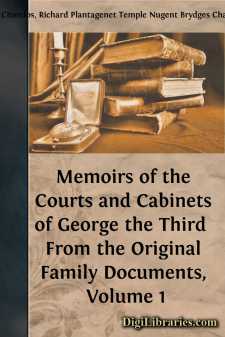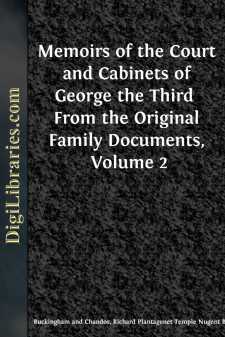Categories
- Antiques & Collectibles 13
- Architecture 36
- Art 48
- Bibles 22
- Biography & Autobiography 813
- Body, Mind & Spirit 142
- Business & Economics 28
- Children's Books 15
- Children's Fiction 12
- Computers 4
- Cooking 94
- Crafts & Hobbies 4
- Drama 346
- Education 46
- Family & Relationships 57
- Fiction 11828
- Games 19
- Gardening 17
- Health & Fitness 34
- History 1377
- House & Home 1
- Humor 147
- Juvenile Fiction 1873
- Juvenile Nonfiction 202
- Language Arts & Disciplines 88
- Law 16
- Literary Collections 686
- Literary Criticism 179
- Mathematics 13
- Medical 41
- Music 40
- Nature 179
- Non-Classifiable 1768
- Performing Arts 7
- Periodicals 1453
- Philosophy 64
- Photography 2
- Poetry 896
- Political Science 203
- Psychology 42
- Reference 154
- Religion 513
- Science 126
- Self-Help 84
- Social Science 81
- Sports & Recreation 34
- Study Aids 3
- Technology & Engineering 59
- Transportation 23
- Travel 463
- True Crime 29
Memoirs of the Courts and Cabinets of George the Third From the Original Family Documents, Volume 1
Description:
Excerpt
As no inconsiderable portion of the Correspondence contained in these volumes relates to the structure and conduct of Cabinets, throwing light upon public affairs from those secret recesses to which historians rarely have access, it may be useful, by way of introduction, to glance at certain circumstances which, during the period embraced in the work, exercised a special influence over the Government of the country: an influence no less directly felt in the councils of Ministers than in the measures and combinations of the Opposition.
The history of Administration in the reign of George III. presents some peculiarities which distinguish it in a very striking degree from that of most other reigns. The key to these peculiarities will be found in the personal character of the Sovereign. To that character, and its immediate action upon political parties, may be traced, to a greater extent than has been hitherto suspected, the parliamentary agitation and ministerial difficulties which were spread over nearly the whole of that long and eventful period. The means of forming an accurate judgment on matters of this nature exist only in confidential details, such as are disclosed in the collection of letters now for the first time laid before the public. In order, however, to render intelligible the allusions that are scattered through them, and to point out their real value as materials for the political history of the time, it is necessary to offer a few preliminary remarks on the circumstances to which reference has been made.
George III.—whose admirable business habits and inflexible integrity inspired the highest deference and attachment amongst the personal friends he admitted to his confidence—was remarkable in no one particular more than in his jealousy of the prerogatives of the Crown. He carried his zeal in that matter so far as even to draw upon himself the charge of desiring to strain the rights of the Crown beyond constitutional limitations. But as these limitations have never been accurately defined, and as it has always been difficult to prescribe the precise privileges which would relieve the Sovereign, on the one hand, from being a mere state puppet, without giving him, on the other, too great a preponderance of executive power, we need not discuss the justice of an imputation which refers to the general complexion of the King's views rather than to any particular acts of arbitrary authority. That it was the great aim of His Majesty's life to preserve the royal prerogatives from encroachment is undeniable; but it should be remembered that when George III. ascended the throne, the relative powers and responsibilities of the Sovereign and his advisers were not so clearly marked or so well understood as they are at present; and if His Majesty's jealousy of the rights which he believed to be vested in his person led him to trespass upon the independence of his servants, or to resist what he considered the extreme demands of the Parliament, it was an error against the excesses of which our Constitution affords the easiest and simplest means of redress.
Intimately conversant with official routine, and thoroughly master of the details of every department of the Government, he acquired a familiar knowledge of all the appointments in the gift of the Ministry, and reserved to himself the right of controlling them. Nor was this monopoly of patronage confined to offices of importance or considerable emolument; it descended even to commissions in the army, and the disposal of small places which custom as well as expediency had delegated to the heads of those branches of service to which they belonged....




